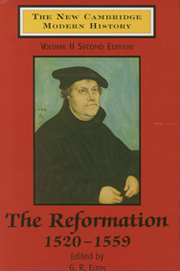Book contents
- Frontmatter
- Introduction to the second edition
- Chapter I The age of the Reformation
- Chapter II Economic change
- Chapter III The reformation movements in Germany
- Chapter IV The Reformation in Zurich, Strassburg and Geneva
- Chapter V The Anabaptists and the sects
- Chapter VI The Reformation in Scandinavia and the Baltic
- Chapter VII Politics and the institutionalisation of reform in Germany
- Chapter VIII Poland, Bohemia and Hungary
- Chapter IX The Reformation in France, 1515–1559
- Chapter X The Reformation in England
- Chapter XI Italy and the papacy
- Chapter XII The new orders
- Chapter XIII The empire of Charles V in Europe
- Chapter XIV The Habsburg–Valois wars
- Chapter XV Intellectual tendencies
- Chapter XVI Schools and universities
- Chapter XVII Constitutional development and political thought in western Europe
- Chapter XVIII Constitutional development and political thought in the Holy Roman Empire
- Chapter XIX Constitutional development and political thought in eastern Europe
- Chapter XX Armies, navies and the art of war
- Chapter XXI The Ottoman empire 1520–1566
- Chapter XXII Russia, 1462–1584
- Chapter XXIII The New World, 1521–1580
- Chapter XXIV Europe and the East
- Index
Chapter XXIII - The New World, 1521–1580
Published online by Cambridge University Press: 28 March 2008
- Frontmatter
- Introduction to the second edition
- Chapter I The age of the Reformation
- Chapter II Economic change
- Chapter III The reformation movements in Germany
- Chapter IV The Reformation in Zurich, Strassburg and Geneva
- Chapter V The Anabaptists and the sects
- Chapter VI The Reformation in Scandinavia and the Baltic
- Chapter VII Politics and the institutionalisation of reform in Germany
- Chapter VIII Poland, Bohemia and Hungary
- Chapter IX The Reformation in France, 1515–1559
- Chapter X The Reformation in England
- Chapter XI Italy and the papacy
- Chapter XII The new orders
- Chapter XIII The empire of Charles V in Europe
- Chapter XIV The Habsburg–Valois wars
- Chapter XV Intellectual tendencies
- Chapter XVI Schools and universities
- Chapter XVII Constitutional development and political thought in western Europe
- Chapter XVIII Constitutional development and political thought in the Holy Roman Empire
- Chapter XIX Constitutional development and political thought in eastern Europe
- Chapter XX Armies, navies and the art of war
- Chapter XXI The Ottoman empire 1520–1566
- Chapter XXII Russia, 1462–1584
- Chapter XXIII The New World, 1521–1580
- Chapter XXIV Europe and the East
- Index
Summary
In a life of bold decisions, none was more significant for the future than Cortés’s decision to rebuild the city of Tenochtitlán-Mexico and to make it the capital of the kingdom of New Spain. The site had many serious disadvantages. It was an island, marshy and reputedly unhealthy; it produced no food of its own, except the fish caught in the lake; its drinking water had to be brought by expensive artificial means from the hills of Chapultepec, several miles away; it communicated with the mainland by causeways, and many among Cortés’s following thought that these causeways, with their easily invested bridges, would be dominated by the Indians of the mainland rather than by the island Europeans. Moreover, a large Indian population still lived on the island, lurking among the ruins of buildings which Cortés had had pulled down in order to dump the rubble in the drainage canals, to facilitate the manœuvres of his cavalry. In short, the site might well be a trap, incapable of resisting siege, and peculiarly vulnerable in its provisioning and water supply.
Cortés, though certainly aware of the economic defects of the place, overrode the objections. He believed it to be as strong a site for Europeans as for Indians. Further, he probably wished to avoid a too rapid dispersal of his followers through the land they had only partly conquered, where they might still become the victims of their new vassals, or of their own disagreements. Finally Cortés was wise enough to appreciate the prestige of Tenochtitlán, its ‘renown and importance’, as he expressed it.
- Type
- Chapter
- Information
- The New Cambridge Modern History , pp. 624 - 655Publisher: Cambridge University PressPrint publication year: 1990



